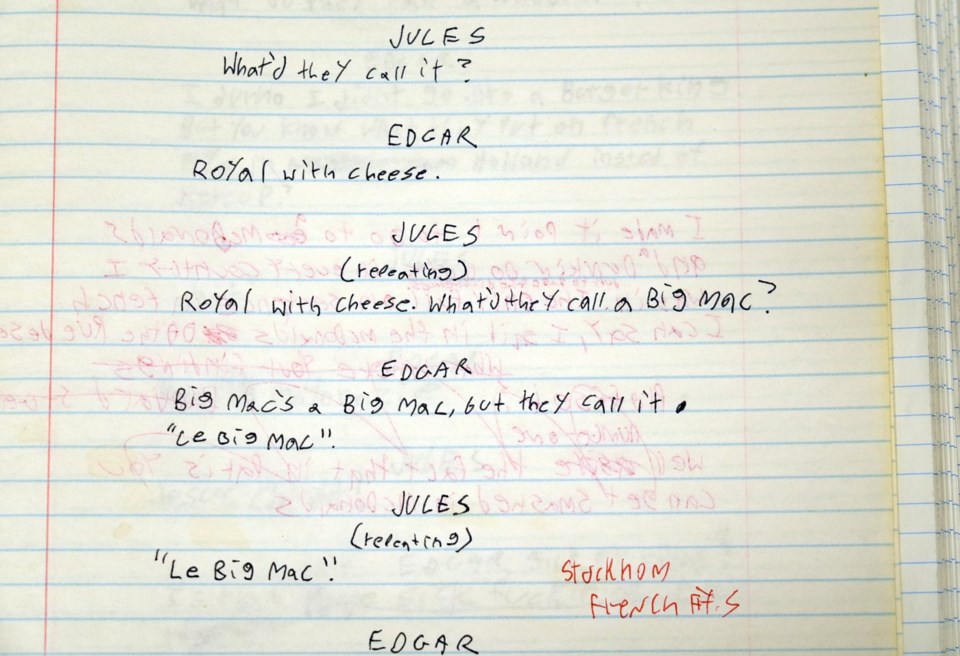No one knew what had in the duffle bag.
He and many other A-listers were gathered recently at the Academy Museum in Los Angeles for its glitzy annual fundraising gala. . And as he approached the podium to make his speech, the bag did not go unnoticed. At the very least, it was unusual.
Then he opened it up and presented its contents: It was his original handwritten script for тАЬPulp Fiction,тАЭ with mistakes, misspellings and all. He was giving it to the museum.
тАЬThe script is legendary,тАЭ said Matt Severson, the executive vice president of academy collection and preservation. тАЬNo one was expected it. This was not a coordinated effort on the part of the academy. This is Quentin thinking what can he do to make his stamp on the museum?тАЭ
ItтАЩs one of many high-profile acquisitions to the vast film memorabilia collection that the organization announced Thursday, including original тАЬPonyoтАЭ art by Hayao Miyazaki, glasses worn by Mink Stole in тАЬPink Flamingos,тАЭ Kurt RussellтАЩs Snake Plissken costume from тАЬJohn CarpenterтАЩs Escape from L.A.,тАЭ animator maquettes of Figaro and Geppetto from DisneyтАЩs тАЬPinocchioтАЭ and six storyboards from тАЬThe Silence of the Lambs.тАЭ
The museum has also acquired personal collections of filmmakers Paul Verhoeven, Barbara Kopple, , and , as well as 70mm prints of and David LeanтАЩs тАЬLawrence of ArabiaтАЭ and тАЬRyanтАЩs Daughter.тАЭ
тАЬWe want items from the history of cinema that relate to all ages and levels of interest,тАЭ Severson said. тАЬWe are preserving this global film history. And itтАЩs something that the academy has been doing since its founding in 1927.тАЭ
Some are coming directly from the stars themselves: Jamie Lee Curtis gifted her tearaway dress from тАЬTrue Lies,тАЭ Bette Midler gave two of her ensembles from тАЬThe RoseтАЭ and Lou Diamond Phillips contributed the guitar he used as Ritchie Valens in тАЬLa Bamba.тАЭ Others are through estates and private collectors. Just last year Steven Spielberg donated his collection of original, hand-drawn nitrate animation cells from тАЬSnow White and the Seven Dwarfs.тАЭ
, which doesnтАЩt work with any other American museum, donated more than 80 pieces of original animation art by Miyazaki and Noboru Yoshida, as well as the studioтАЩs Japanese movie posters and an animators desk used at the studio.
тАЬTo have original artwork from Miyazaki? It takes your breath away,тАЭ Severson said.
The Academy Museum has more than 52 million items in its collection тАФ the largest in the world тАФ spanning the history of cinema. Not everything is on display, but components of the AcademyтАЩs collection can be accessed several ways: The museum itself, the Margaret Herrick Library, the Academy Film Archive and online.
At the gala, Severson heard from the likes of Nicole Kidman, Demi Moore, Jeff Goldblum and Tarantino how passionate they are about the work the museum is doing. He was quick to point out that it all starts with the staff working to preserve and present all the items in the best way possible. That includes the film preservation team and the paper conservators who arenтАЩt just binding books but restoring photographs and posters damaged over time, as well as the team who spent an enormous amount of time bringing the belt from the 1982 film тАЬTron,тАЭ which had partially dissolved, back to life.
тАЬYou may not be aware of the painstaking labor that goes into preserving those objects,тАЭ Severson said. тАЬIt is important to pass this knowledge on to new generations of creatives and young filmmakers and artists to understand the history of the art form.
"This museum does become a platform that showcases our dynamic history and not just the history of Hollywood, but the global film industry.тАЭ
Lindsey Bahr, The Associated Press


